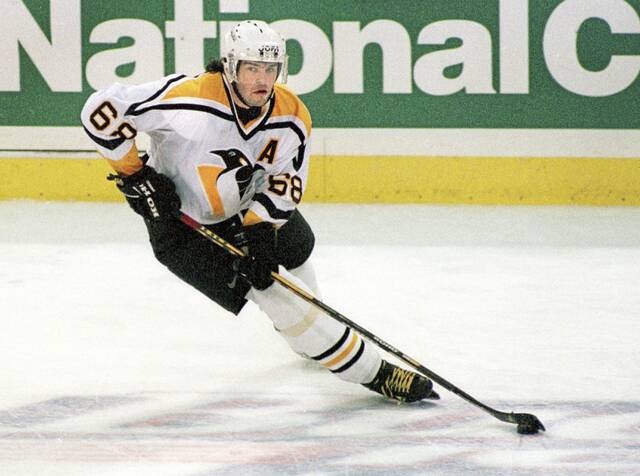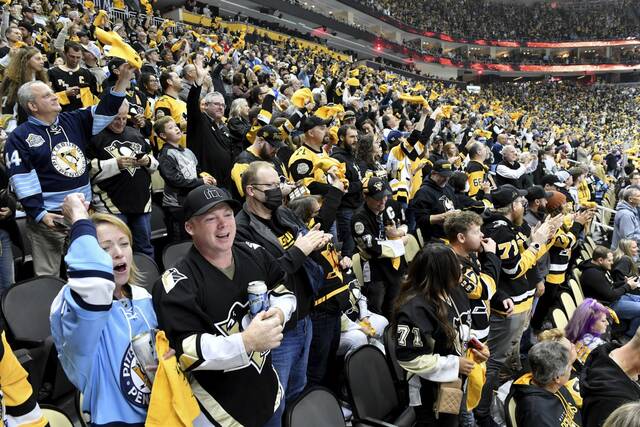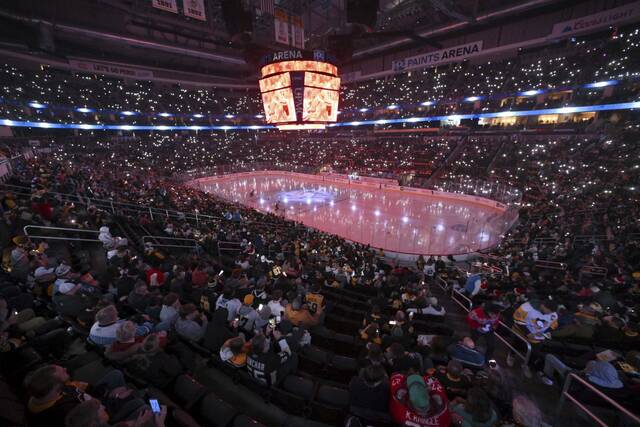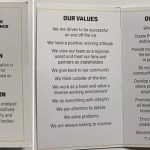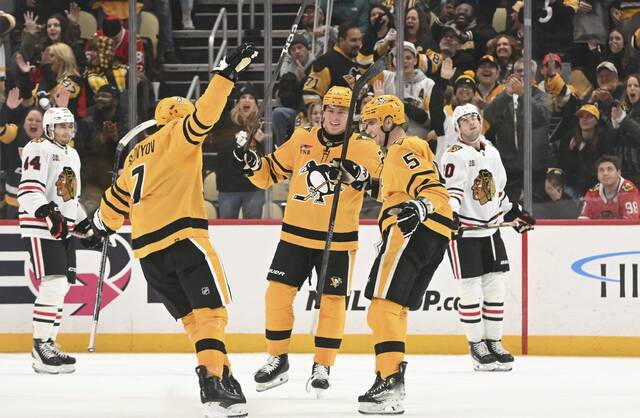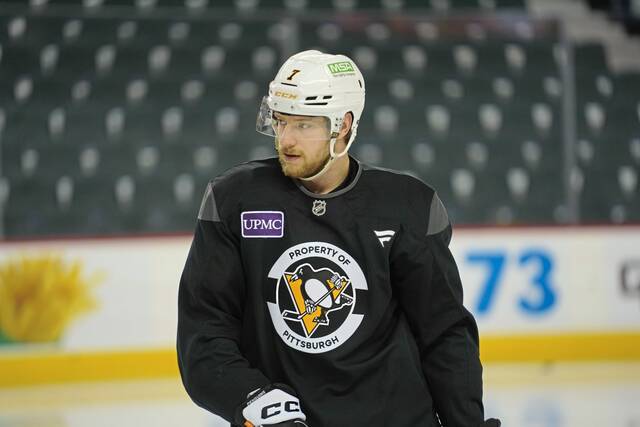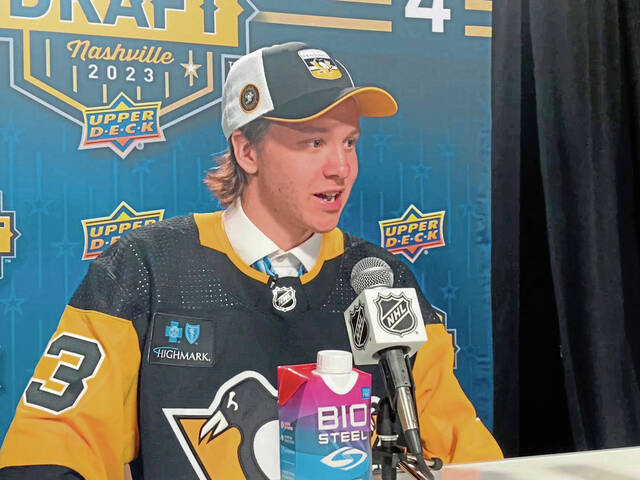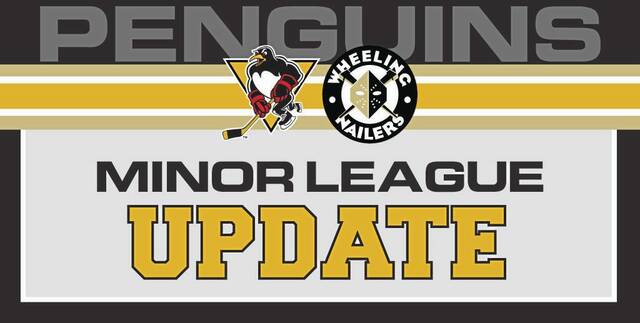By education, Kevin Acklin is a lawyer. He has degrees from Harvard and Georgetown to prove it.
By title, he is the president of business operations for the Pittsburgh Penguins.
By reality, he is a salesman for the franchise he grew up rooting for.
Often Acklin can be spotted walking the upper concourse of PPG Paints Arena on game nights, taking the temperature of the fans as they look for their seats, purchase popcorn and debate whether to sink three figures into buying one of the five jerseys the team will wear this season.
Occasionally, that involves some on-the-scene seat upgrades. Acklin, who got detention at Central Catholic when he skipped class to attend the Penguins’ first Stanley Cup parade in 1991, carries his own tickets — actual physical tickets, not the digital versions on a smartphone — for each and every game.
“I typically give them away,” Acklin said during an interview with the Tribune-Review on Dec. 22. “One of the best parts of this job is I’ll go up to the second floor and I walk around and I look for a family who is maybe at their first game. And I’ll say ‘Do you want to upgrade?’ and then they go down and they sit in the club and I get them hats and stuff.”
Handing away a handful of seats in prime real estate as well as some merchandise might not be a sound business practice to those keeping the books. But for Acklin, such an act is an investment in the future of the franchise as well as the sport in the region.
Those fans might be more enticed into buying more tickets or taking up hockey in a grassroots level.
That mindset is congruent with the views of the team’s new owners, Fenway Sports Group.
Saturday marks the first anniversary of Fenway Sports Group formally taking stewardship of the franchise, having purchased it from the Lemieux Group, which was led by the iconic Mario Lemieux and the deep-pocketed Ron Burkle.
Lemieux and Burkle remain as minority owners and Lemieux still serves as a face of the Penguins (and probably always will). Earlier this month, he issued a statement on behalf of the franchise that mourned the death of Pittsburgh Steelers great and civic treasure Franco Harris.
But make no mistake, the Penguins are now one of the prized assets in Fenway’s stable, which includes the Boston Red Sox of Major League Baseball and Liverpool Football Club in England’s Premier League.
So, one year into this union, what’s the biggest difference?
For Acklin individually, it’s his gig.
Previously, he served as the team’s chief operating officer and general counsel. After David Morehouse stepped down as CEO and president in April, Acklin was promoted to president of business operations in June.
Beyond that, Acklin portrays a different direction for the business side of the franchise with new ownership, largely based on connections with the group’s other franchises.
“It was very much a grass-roots bottoms-up transition,” Acklin said. “I told everybody to meet your counterparts in Liverpool and in Boston, learn what they’re doing, learn from their mistakes. We can learn from each other. It’s really informed a lot of our decision-making by sharing those experiences for our partners. … Now they’re more connected to the Red Sox and these other markets that they otherwise would not have access to. So that’s probably the biggest change, I think.”
There’s been a multitude of changes for the Penguins that have occurred independently of a new owner. Such as the pandemic.
Acklin touched base on the realities of trying to run a franchise at a time when the effects of covid-19 are still being felt as well as a number of other subjects including inflation, sagging ticket sales, the slow development of the Civic Arena site and another franchise icon by the name of Jaromir Jagr.
• On the management style of Fenway, Acklin suggests the group is actively involved in day-to-day operations but not to a granular level.
“They’re here a lot. They come to games here in Pittsburgh. You have kind of your core owners, the principals who watch every game,” Acklin said. “If they’re not here, they’re commenting on the team and what we’re doing, obviously, as an organization on the business side.
“They love Pittsburgh. There’s a lot of synergies there between our fan base and the Boston fan base, that kind of gritty culture. I think they understand the importance of sports to the DNA of Pittsburgh. I do, of course. I grew up here. And I remember during the (completion of the franchise’s sale) telling them that growing up as a kid in South Oakland, in the late (1970s), early 80s, when the steel industry collapsed and we had 30-40% unemployment, it was really the Pirates and the Steelers in the late ‘70s to kind of carry the city through that. And so we know as the three major sports teams have an obligation because we’re part of the DNA of the city. And I think that they respect and have candidly invested in that ethos.
“They (Fenway) love to win. And they spend to win. They play to win.”
• That pursuit of winning goes beyond the ice or even hockey operations personnel.
All staffers are made aware of the franchise’s key values with a card similar to a pocket schedule, a practice that began under Morehouse.
“Everyone here has our mission and vision for the organization on a card,” Acklin said. “It’s to be the best organization in sports and respected for our culture of excellence on and off the ice. And our mission is to win the Stanley Cup, energize and inspire our fans, positively impact our community and advance the game of hockey. Each of those four pillars, everything we do as an organization is really lined up within advancing our goals there.”
• In addition to granting upgraded tickets, the Penguins continue to make efforts to introduce the sport to the community at a grassroots level. That initiative was largely in place under previous ownership and has carried over.
Placing a seasonal rink inside the Alfred E. Hunt Armory in Shadyside was the result of that pursuit.
“We didn’t sit on our tuffets during the pandemic. We went to work,” Acklin said. “The first thing was, how do we stay relevant to the community? We sat in a room, we whiteboarded it. That’s how the idea for the armory came.
“If we want to diversify the game, we need to bring it to the city — players of color, single parents, maybe living in tough city neighborhoods don’t have all those resources. So that was one idea that we had that is paying dividends.”
Other initiatives have included hosting women’s games, including one contest between the United States and Canada national teams at PPG Paints Arena in March. Additionally, a showcase event for the Professional Women’s Hockey Players Association was staged at the UPMC Lemieux Sports Complex in Cranberry in November. Acklin expressed a desire to bring a professional women’s franchise to Pittsburgh, though any plans for that are in the embryonic stages.
• Another area the team is in the process of addressing is their home venue. PPG Paints Arena, which opened in 2010, is slated to undergo a series of considerable upgrades this summer.
“We’re advancing, for the first time in 12 years, a number of capital improvements here,” Acklin said. “A new scoreboard, LED system. All of that’s meant to enhance the fan experience. So everything we do with our ownership team, in getting their approval, is to make PPG Paints Arena the best arena in the league. And we want our fan base to come here and have a fantastic experience.”
• Sports are a considerable luxury in any backdrop but especially so during times of inflation when essential items such as bread and milk are pricier. How have the Penguins adjusted?
“We’ve actually repriced our tickets over the summer, for the first time in 12 years,” Acklin said. “For season ticket holders, we looked at historically, the numbers have just gone up a few percent a year. We looked at the arena itself, and some seats deserve to go up like the glass seats in the same double attack zone. So we did kind of a market check. And we found that some seats in the upper bowl, a few rows back, were probably overpriced. And so we repriced the ticket, but some seats were underpriced. That rescale, as we called it, was something we did in August.
“We recognize that people are busy, they have a lot of demands on their time and money. We want to make sure that when they come to a Penguins hockey game, they feel ownership of the organization and they know that they’re paying a team that is committed to winning and is committed to the city and is committed to using this platform for positive social change.”
• Through their first 18 home games this season, the Penguins have played to an average attendance of 17,590, a figure that equates to a capacity percentage of 96.7% of PPG Paints Arena, which has 18,187 seats for hockey.
Against most contexts, those are outstanding figures. But against the context of a 14-year sellout streak that came to an end in October of 2021, it looks a little less impressive. As it is, they have only enjoyed six sellouts this season in 18 home games.
Are there any concerns over a dip in those figures? And what has led to the decline?
“I think it’s a number of reasons,” Acklin said. “I mean, in some respects, we compete against ourselves with television. We have the No. 1 ratings in the league. And so sometimes people want to sit at home and watch. We still want them to come here. There’s nothing like live hockey. The change started pre-pandemic. Certainly, the pandemic accelerated it. … We’re not concerned. From a revenue perspective, we’re seeing great results of people coming here.
(Note: The Penguins led all local American NHL markets in television ratings during the 2021-22 season with a figure of 7.79 according to Sports Business Journal. The Vegas Golden Knights were second at 5.08.)
“We’re a team (that will spend to the limits of the salary cap). As long as I’m here, we will be a cap team. And obviously, our ownership is committed to that as well. And so I don’t think we have any concern. Those Mondays and Tuesday games are difficult, especially in the early part (of the season). I think we had eight October games last season, which were difficult. We’re not just dumping tickets on the market, because that would affect people’s purchasing decisions. We’re being very selective.”
To be certain, this isn’t an issue exclusive to the Penguins. All sorts of entertainment venues in all corners of the country have seen dips in attendance.
“This is a sports-wide problem that everyone’s facing,” Acklin said. “We realize we got to innovate and make it more exciting for people to come here.”
• One thing that could make it more enticing for anyone to come to PPG Paints Arena or the Uptown area would be some level of development at the site of the long-demolished Civic Arena.
Within the past 15 months, substantial development of the 28-acre plot of prime real estate has begun with the FNB Financial Center adjacent to Washington Place and Bedford Avenue.
Acklin, who previously worked as chief of staff to former Pittsburgh mayor Bill Peduto, has seen the slow process unfold from the public and private sectors.
“Development that is driven to achieve goals beyond building buildings is always hard,” Acklin said. “And we’re not afraid of that. It’s something that we’ve embraced. And ultimately, it’s a partnership with the city to make sure that the Lower Hill (District)/former Civic Arena site, that we all can be proud of what was built there. It’s also going to be an entertainment center for our fans pre- and postgame. Our hope is they come there, grab a beer before the game, go to dinner, and then have entertainment options after the game.
“There’s a lot happening in Uptown and in the Lower Hill, and so it’s taken a long time. The pandemic had something to do with it. We had to really shut things down by order of the governor. We shut down construction early in the early stages, and we had some delays there. But we’re on track.”
• Part of the development will eventually include residential, parking garages and even an outdoor concert venue, similar to the North Shore’s Stage AE, but on a larger scale.
There are similar arena districts in nearby cities such as Columbus, Ohio, and Washington. Acklin sees those as templates that can be exceeded but points out one difference.
“Those were sort of fallow areas of the city that it was easy to build because there wasn’t anybody living there,” Acklin said. “Yeah, we’re building in the middle of a neighborhood. And we want to be a neighbor that empowers and advances equity in the Hill District and beyond. That’s part of what’s exciting about this development. We’re not just building a new center of energy for the city that helps attract our fan base. We’re really making up for some of the past wrongs that happened in the 1950s, when a lot of that land was taken by eminent domain. So we’re intentionally committed to advancing equity.
“It makes it hard, but we’re making progress. We’ve built a development team, with residents of the Hill District that are part of that. I know some people say that it should be easier. But authentic, community-driven development is always very difficult. But at the end, when it’s built, everyone can be proud of it. And that’s ultimately what we’re trying to accomplish.”
• In a demonstration of the synergy between the Penguins and their new owners, they will be visitors to Boston’s famed Fenway Park for the next edition of the NHL Winter Classic on Monday as they face the Boston Bruins.
Such a contest is a showcase for each team involved and even more so for the host city. A similar tentpole event is an All-Star Game. The Penguins have made it known to the league they would like to host another one. The first and only NHL All-Star Game held in Pittsburgh was in 1990 at the Civic Arena.
“We are in conversations about that,” Acklin said. “Obviously, we’d like to have it when the developments (at the Civic Arena site are) closer to being completed and all that construction outside is done. But there’s a press. It’s been too long. It’s been five (Stanley Cup titles) since the last time the All-Star game was in Pittsburgh. We think the fans would be excited to host it here.
“It’s something that we’d love to do. We told the league that.”
Other events such as the NHL Draft or the World Cup of Hockey — each having been staged at PPG Paints Arena in some fashion during the 2010s — are also desirable for the Penguins.
• One All-Star who seems destined to return to Pittsburgh in some form is franchise icon Jaromir Jagr.
At 50, Jagr is still an active player with Rytiri Kladno, a team he also happens to own in his native Czechia.
When the Penguins reintroduced their “pigeon” logo for one of the five jerseys they are wearing this season, the team sent Jagr a jersey out of respect for his outstanding tenure with the team that was primarily associated with that logo.
That led to a phone conversation between Jagr and Acklin about a potential reunion with the team he parted ways with via a messy divorce in 2001.
Acklin stopped short of any specifics but something along the lines of a jersey retirement would appear to be in line for a player of Jagr’s stature.
“When I had a conversation, he said, ‘Make sure (general manager Ron Hextall) knows I’m available,’” Acklin quipped. “Obviously we think very highly of all our stars that have played here. But Jagr has a special place in Pittsburgh, and we’re going to hold conversations until when he’s ready to hang up the skates for good.
“But certainly, at some point in the future, we’d love to have him come back home.”






